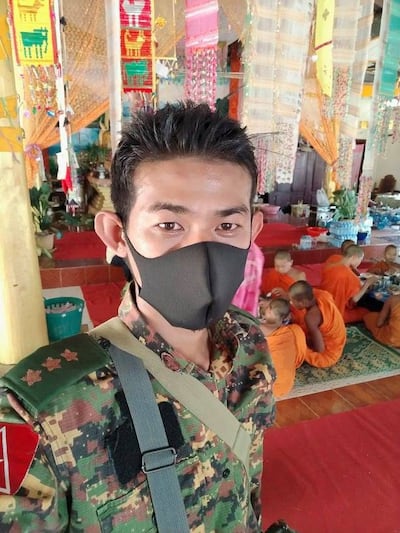Capt. Lin Htet Aung left the Myanmar Army’s Light Infantry Battalion #528 to join pro-democracy forces resisting the military coup that seized power from the elected government on Feb. 1, citing voting fraud in the November 2020 elections. He told Khin Maung Soe of RFA’s Myanmar Service in a telephone interview from an area outside military regime control that about 800 officers and soldiers – roughly five battalions -- have defected since the coup. RFA could not independently verify that number. The following Q&A has been edited for clarity.
RFA: Can you tell us how many members of the Armed Forces have defected to the people’s side?
Lin Htet Aung: There are around 800. That's about the size of five battalions in Myanmar’s military structure. Some of them were from the army and many are from the Navy, the Air Force, artillery units, the Defense Service factories, etc.
RFA: How do you get these numbers?
Lin Htet Aung: We have contacts with one another and also from other sources.
RFA: What is the security situation of these people?
Lin Htet Aung: Those who have arrived in the liberated areas and territories held by ethnic armed groups have security. For those who have joined ordinary citizens, we are a bit worried for their security. People are trying to give them some protection, though, and some have contacted us for help.
RFA: What about the welfare of these former soldiers?
Lin Htet Aung: Most of them left their units without much money in hand. Those who have arrived in territories held by ethnic groups do not have to worry about food and lodging.
RFA: What about their families left behind?
Lin Htet Aung: Most of them are single. Those with families who arrived in territories held by ethnic groups do not have any problems. But some of them had left their families in their mother units and we are a bit worried for them.
RFA: How many officers have defected from their units?
Lin Htet Aung: There are about 100 among the officers but the majority are from lower ranks.

RFA: What are you doing now?
Lin Htet Aung: Most of us have decided to join the armed revolution. Those who do not want to join the armed revolution are seeking ways to help the people in whatever capacity they can.
RFA: There are some people who are suspicious of people like you who have defected. Some people think you could be spies. How do you feel about these doubts and suspicions?
Lin Htet Aung: Yes we have faced such situations. But I believe we will gradually win their trust. We will need time but I hope they will soon realize we genuinely want to oppose military dictatorship.
RFA: Do you think we could say there might be military agents among those who have crossed over?
Lin Htet Aung: Of course it is possible. We cannot trust everyone. We systematically checked everyone who contacted us directly. We have to be very careful because they have very qualified people gathering intelligence. We understand why people hated the military so much and that’s why we are joining them. We also hate military dictatorship as much as the people do. Our main objective is to join hands with the people and bring down the military dictatorship.
RFA: Do you face any other difficulties?
Lin Htet Aung: Though we can say we are now in liberated areas we don’t actually know what we should be doing or what role we should take. Most of us who defected have pure goodwill in our hearts towards the people.
RFA: Do you think there will be more members of the Armed Forces coming over to the side of the public?
Lin Htet Aung: Changing sides is an important tactic for this revolution. At first, we had hoped about 4,000 of the 400,000-strong military would change sides. But now we are expecting more than 4,000 will come to the aid of the people.
RFA: The present revolution relies a lot on the ethnic armed groups and they have been staging a revolution fighting for their rights for many years. How do you think the two revolutions can be combined?
Lin Htet Aung: We cannot just ask for assistance from them and leave but we will have to help them achieve their goals, too. If we leave them after seeking help from them, then it will be like we are fighting for Burma proper only. If we are to fight for the entire country, we will have to complement each other to achieve better results.
RFA: Do you have any progress in working together with the National Unity Government (NUG)?
Lin Htet Aung: The NUG is working very hard through a lot of difficulties and we have found some cooperation between them and us. We are very encouraged.
Translated by Khin Maung Nyane.
